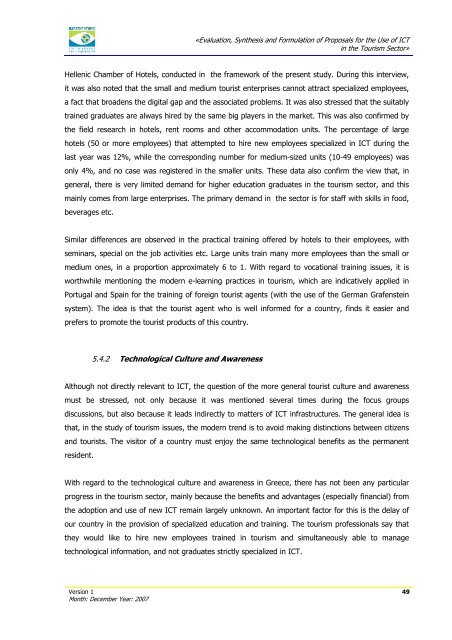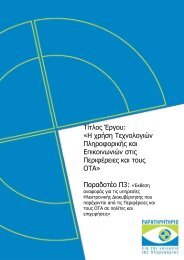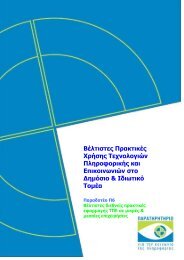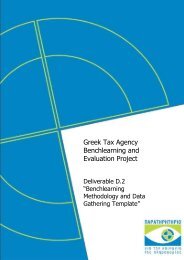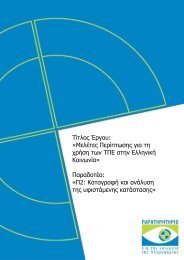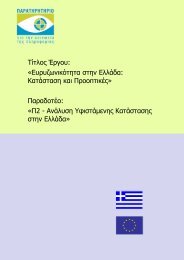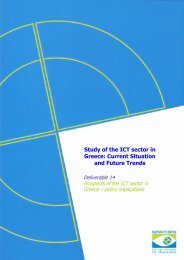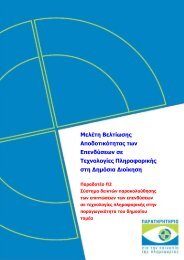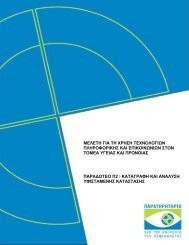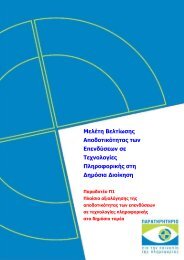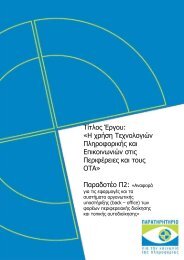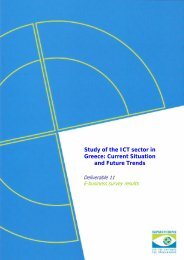Evaluation, Synthesis and Formulation of Proposals for the Use of ...
Evaluation, Synthesis and Formulation of Proposals for the Use of ...
Evaluation, Synthesis and Formulation of Proposals for the Use of ...
Create successful ePaper yourself
Turn your PDF publications into a flip-book with our unique Google optimized e-Paper software.
«<strong>Evaluation</strong>, <strong>Syn<strong>the</strong>sis</strong> <strong>and</strong> <strong>Formulation</strong> <strong>of</strong> <strong>Proposals</strong> <strong>for</strong> <strong>the</strong> <strong>Use</strong> <strong>of</strong> ICTin <strong>the</strong> Tourism Sector»Hellenic Chamber <strong>of</strong> Hotels, conducted in <strong>the</strong> framework <strong>of</strong> <strong>the</strong> present study. During this interview,it was also noted that <strong>the</strong> small <strong>and</strong> medium tourist enterprises cannot attract specialized employees,a fact that broadens <strong>the</strong> digital gap <strong>and</strong> <strong>the</strong> associated problems. It was also stressed that <strong>the</strong> suitablytrained graduates are always hired by <strong>the</strong> same big players in <strong>the</strong> market. This was also confirmed by<strong>the</strong> field research in hotels, rent rooms <strong>and</strong> o<strong>the</strong>r accommodation units. The percentage <strong>of</strong> largehotels (50 or more employees) that attempted to hire new employees specialized in ICT during <strong>the</strong>last year was 12%, while <strong>the</strong> corresponding number <strong>for</strong> medium-sized units (10-49 employees) wasonly 4%, <strong>and</strong> no case was registered in <strong>the</strong> smaller units. These data also confirm <strong>the</strong> view that, ingeneral, <strong>the</strong>re is very limited dem<strong>and</strong> <strong>for</strong> higher education graduates in <strong>the</strong> tourism sector, <strong>and</strong> thismainly comes from large enterprises. The primary dem<strong>and</strong> in <strong>the</strong> sector is <strong>for</strong> staff with skills in food,beverages etc.Similar differences are observed in <strong>the</strong> practical training <strong>of</strong>fered by hotels to <strong>the</strong>ir employees, withseminars, special on <strong>the</strong> job activities etc. Large units train many more employees than <strong>the</strong> small ormedium ones, in a proportion approximately 6 to 1. With regard to vocational training issues, it isworthwhile mentioning <strong>the</strong> modern e-learning practices in tourism, which are indicatively applied inPortugal <strong>and</strong> Spain <strong>for</strong> <strong>the</strong> training <strong>of</strong> <strong>for</strong>eign tourist agents (with <strong>the</strong> use <strong>of</strong> <strong>the</strong> German Grafensteinsystem). The idea is that <strong>the</strong> tourist agent who is well in<strong>for</strong>med <strong>for</strong> a country, finds it easier <strong>and</strong>prefers to promote <strong>the</strong> tourist products <strong>of</strong> this country.5.4.2 Technological Culture <strong>and</strong> AwarenessAlthough not directly relevant to ICT, <strong>the</strong> question <strong>of</strong> <strong>the</strong> more general tourist culture <strong>and</strong> awarenessmust be stressed, not only because it was mentioned several times during <strong>the</strong> focus groupsdiscussions, but also because it leads indirectly to matters <strong>of</strong> ICT infrastructures. The general idea isthat, in <strong>the</strong> study <strong>of</strong> tourism issues, <strong>the</strong> modern trend is to avoid making distinctions between citizens<strong>and</strong> tourists. The visitor <strong>of</strong> a country must enjoy <strong>the</strong> same technological benefits as <strong>the</strong> permanentresident.With regard to <strong>the</strong> technological culture <strong>and</strong> awareness in Greece, <strong>the</strong>re has not been any particularprogress in <strong>the</strong> tourism sector, mainly because <strong>the</strong> benefits <strong>and</strong> advantages (especially financial) from<strong>the</strong> adoption <strong>and</strong> use <strong>of</strong> new ICT remain largely unknown. An important factor <strong>for</strong> this is <strong>the</strong> delay <strong>of</strong>our country in <strong>the</strong> provision <strong>of</strong> specialized education <strong>and</strong> training. The tourism pr<strong>of</strong>essionals say that<strong>the</strong>y would like to hire new employees trained in tourism <strong>and</strong> simultaneously able to managetechnological in<strong>for</strong>mation, <strong>and</strong> not graduates strictly specialized in ICT.Version 1Month: December Year: 200749


